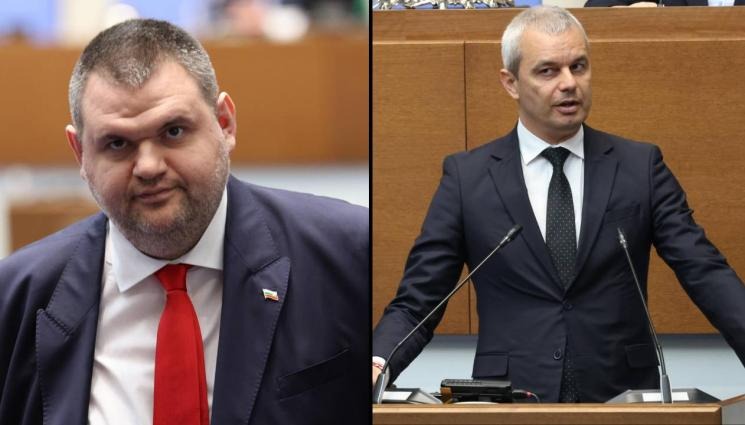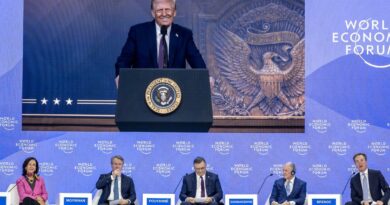The Vote of No Confidence: A Geopolitical Masquerade
This vote of no confidence is far from a routine parliamentary maneuver—it weaves together multiple objectives where the interests of “Vazrazhdane” and Delyan Peevski converge in a surprisingly seamless, though outwardly antagonistic, alignment. Beneath the veneer of political rhetoric lies a complex game that serves both Russia’s hybrid ambitions and the personal agendas of key figures in Bulgaria’s power structure.
Vazrazhdane’s Objectives
For “Vazrazhdane,” the vote is a tool to amplify Russian narratives in the hybrid war against Bulgaria—a war Moscow wages with disinformation and subversive political tactics. The goal is to redirect public attention to core talking points that question Bulgaria’s “added value” as a NATO and EU member, particularly in the context of the war in Ukraine. This includes Europe’s efforts—both within the “coalition of the willing” and beyond—to forge an autonomous defense policy and bolster Ukraine as the frontline of the European security system. Bulgaria’s deeper engagement in these processes brings tangible benefits: not only for its security, but for its military industry, which produces ammunition and equipment (an area where “Vazrazhdane” cannot openly object due to economic stakes), but also for directly absorbing combat experience from Ukraine’s armed forces. This know-how could modernize the Bulgarian army, from training to armament. Simultaneously, Bulgaria’s industry strengthens its role as an indirect arms supplier to Ukraine via third countries—a reality already in motion.
Support Independent Analysis
Help us keep delivering free, unbiased, and in-depth insights by supporting our work. Your donation ensures we stay independent, transparent, and accessible to all. Join us in preserving thoughtful analysis—donate today!
Through this vote, the Kremlin, leveraging “Vazrazhdane” and its satellite parties like MECH and “Velichie,” seeks to pull the debate back to the imaginary threat of Bulgaria’s deeper integration into Europe’s Ukraine policy. Their central thesis will be that Prime Minister Rosen Zhelyazkov lacks a legitimate mandate to pursue this pro-European, pro-Ukrainian course—a narrative that echoes President Rumen Radev’s rhetoric. Criticism of foreign policy will inevitably resurrect familiar clichés: Bulgaria shouldn’t increase its defense budget, the EU is dragging us into war, while Putin supposedly offers peace. These are battle-tested staples of Russian propaganda, designed to erode trust in our Euro-Atlantic alliances and weaken public support for aiding Ukraine.
Peevski’s Hidden Agenda
This is the visible layer of “Vazrazhdane’s” strategy, but a concealed motive directly serves Delyan Peevski’s interests. The vote comes at a pivotal moment: speculation swirls that the Alliance for Rights and Freedoms (ARF) might withdraw support from Zhelyazkov’s cabinet, potentially leaving Peevski’s DPS “New Beginning” to swoop in as the savior, garnished with narratives of his “indispensable” stabilizing role. More critically, the vote temporarily shifts public focus away from corruption scandals, notably the Chiren gas storage case, and potential charges against Peevski and his favorites like Vladimir Malinov (head of Bulgartransgaz, implicated in Gazprom dealings). For Peevski, halting the momentum of these revelations is paramount. Investigations by the European Public Prosecutor’s Office into the Chiren project and his “Magnitsky” sanctions have him under mounting pressure. In this bind, he needs a distraction—and “Vazrazhdane” hands him the perfect diversion.
Whenever Peevski’s reputation falters, a convenient geopolitical “drama” emerges, allowing him to show off his “value” to the West. By backing Euro-Atlantic moves in “challenging” times—whether voting for military aid to Ukraine or ostentatiously distancing himself from pro-Russian parties during a vote against a pro-Atlantic premier—he casts himself as a pillar of stability and a loyal partner to Brussels and Washington. This vote offers precisely that stage: he can confront “Vazrazhdane” in parliament, defend Zhelyazkov’s government, and parade as a champion of Euro-Atlanticism. Yet, as corruption scandals escalate, this gambit loses its luster—Western allies are increasingly skeptical of his “reliable partner” façade. Thus, “Vazrazhdane” provides him an artificial shield, redirecting scrutiny from graft to foreign policy squabbles.
Meanwhile, the government ramps up PR for the expansion of the transmission network of Bugartransgaz, led by Malinov, who faces European prosecution scrutiny and is closely tied to Peevski. This push, framed as enhancing the Vertical Gas Corridor’s capacity for post-war reconstruction and diversification away from Russian gas, masks a familiar Moscow ploy via its Bulgarian proxies: under the guise of diversification from non-Russian sources, over 90% of the gas transmitted through Bulgartransgaz’s network at present remains Russian. It’s more of the same Kremlin game—control via gas price dumping masquerading as diversification.
The Convergence
The interests of both Vazrazhdane and Peevsky meld in this meticulously staged theater. “Vazrazhdane” gains a platform to peddle Russian talking points and undermine the pro-European government, while Peevski exploits the attention its anti-Western rhetoric gains to deflect from his woes and paint himself as indispensable to a pro-EU governance stability. This isn’t a random coincidence but a symptom of Bulgaria’s entrenched political model, where pro-Russian and ostensibly pro-Western oligarchic forces shake hands behind closed doors while feigning conflict on the public stage.
What Lies Ahead?
The debates surrounding the vote will be loud and polarizing but are unlikely to topple the government—at least not yet. More likely, they’ll deepen societal rifts and fuel Russia’s hybrid war against Bulgaria. Peevski will keep maneuvering, leaning on GERB and other coalition partners to preserve his clout. “Vazrazhdane,” meanwhile, will rack up political capital with its base, posing as the main defender of “national interests” against a “warmongering West.”
The real cost, however, falls on us: eroded trust in institutions and a delayed reckoning with corruption, perpetually overshadowed by these geopolitical charades.
Ilian Vassilev




